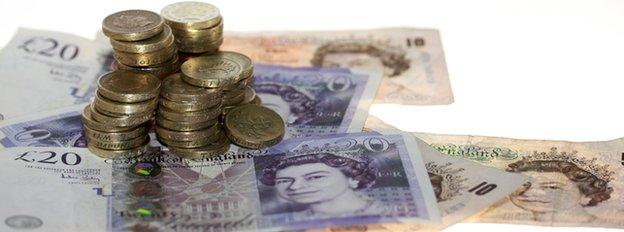Scotland's referendum: What are the issues around currency?
- Published
What currency would Scotland have in the event of independence? It's one of the big questions ahead of September's referendum.
In the event of a "Yes" vote, the Scottish government says the pound would be kept as part of a formal currency union with the rest of the UK.
But the three main Westminster parties - the Conservatives, Labour and the Liberal Democrats - have ruled out such a deal, effectively saying that whoever is in power after the next UK election would block such a move.
Here, we bring together the main stories, explainers and official documents covering the issue.


What's the current set up?
Pretty straightforward - pound sterling is the internationally recognised currency for the whole of the UK.

What could change post-Yes?
The Scottish government says Scotland would continue to use the pound under their planned currency union. The Westminster parties have ruled out agreement - or have they? In March, The Guardian, external quoted an unnamed UK minister saying a currency union might happen if, for example, Trident stayed at Faslane on the Clyde.

What do the pro-Union parties have to say?
Chancellor George Osborne and Treasury Secretary Danny Alexander have been clear - saying it is wrong to suggest a currency union would happen. The chancellor says there is "no legal reason" why the rest of the UK would want to share sterling with an independent Scotland, and referred to advice from a senior Treasury official.

Who is saying what, including the view of business?
The prospect of a currency union - or not - is a crucial factor to businesses throughout the UK. Some have said independence wouldn't be an issue, while others have contingency plans allowing them to move Scottish operations south of the border in the event of a "Yes" vote.
Liz Cameron, chief executive of the Scottish Chamber of Commerce, answers your questions about the independence referendum.
Finance Secretary John Swinney MSP answers your questions on the Scottish independence referendum in a BBC Scotland webcast.
Head of the Better Together campaign, Alistair Darling, was answering questions from website users

Big reading - reports in full
... and for more reading on the referendum debate go to the BBC's Referendum library